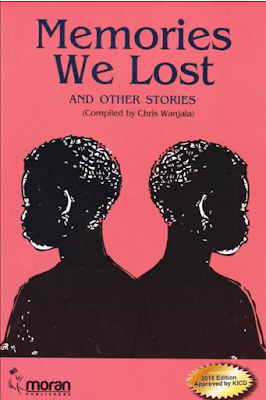MY FATHER’S HEAD – OKWIRI ODUOR
My
Father’s Head by Okwiri Oduor is an exquisite tale about
a young woman trying to cope with the death of her father. As we get immersed into the riveting prose poetry, we soon get entangled in the mystery of grief
and mourning.
The story opens with the words: “I had meant to summon my father only long enough to see what his head
looked like but he is here now and I did not know how to send him back”.
Simbi is the first person narrator. She works as a
caregiver in an old people’s home. Her father is dead. The solitude and vacuum
created by his death compel her to summon him from the mysterious world of the dead.
Now he is here and she does not know how to send him back. Of course her father
is not here physically; he is only here as an illusion created by her memory.
Many Africans believe that dead relatives can visit
sometimes in form of spirits and we can actually see them. Okwiri seeks to
debunk this mystifying myth. Ghosts and spirits are actually images we create
in our minds -a figment of imagination
One night Simbi spends the entire night on her stomach
on the sitting room floor drawing her father. She could see his face, his mouth,
irises, ear and temple and even a thick line of sweat and brown veins. His
head, however “refuses to appear within the borders of the paper”
When she shows Bwibo (the cook at the old people house)
some of the drawings, Bwibo says, “Your father was a good man. Good men never
show you their heads; they show you their faces”
Indeed Simbi’s father was a good man. His memories linger in Simbi’s mind. She remembers how her father could chew a handful of groundnuts and feed the mush to her. She was old enough to chew with her own teeth but young enough to desire that hot masticated love.
She remembers the
day he mourned the death of his friend Sospeter son of Milkah, who taught Agriculture,
in Mirere Secondary when he heard about it through the radio.
After listening to a sermon by father Ignatius Okello from
Kitgum, Simbi is reminded of her own father. She says “I was stringing together images of my father, making his limbs move
and his lips spew words so that at the end he was a marionette and my memories
of him were only scenes in a theoretical display”
She remembers him as an industrious reliable man who
was ready to help people who flocked their house every Saturday morning when
the water pipes burst or when a maid flushed a baby down the toilet.
As much as he was a good man, people only saw his face
and not the head. People judge a book by its cover. The face represents the
superficial outward (physical) appearance. What people fail to see is the inner
spiritual realm. A man’s trait, values or what he truly espouses.
As we try to understand Simbi’s vague stream of consciousness, we appreciate the recollection of painful pent-up memories. The father appears to her as a form of memory.
The story is therefore about coping with
loss or grief. The incomplete drawing symbolizes the incompleteness of memory
as we try to recreate the past. Our dead loved ones can only return in form of
hazy dim recollections, not in physical form. The fact that they existed and
now they don’t may create a puzzling state of confusion.
When her father appears to her he looks paradoxical to
say the least; “he was something at once
strange and familiar, at once enthralling and frightening- he was the brittle,
chipped handle of a ceramic tea mug and he was the cold yellow stare of an owl.”
Simbi serves him tea and tells him about his friend
Pius Obote who died four years ago. He grieves bitterly. After the tea, her
father asks to leave. She asks him to stay for a couple of days. She confesses,
“I did not really want him back. I just
wanted to see his head.”
Grief is indeed a difficult thing to comprehend. Just
like death and loss, some of the characters in the story are shrouded in
mystery and only vaguely described. Take for instance the woman who hawked
candy, or a man whose one roomed house is a kindergarten in the day time and a
brothel in the evening, or the woman whose illicit brew had blinded five people
in January.
It is important to appreciate people when they are
alive. Look at their head (character traits) not just their faces (appearance).
Next: Analysis of Umbrella Man by Siddartha Gigoo.
See analyses for all stories in Memories we Lost here










This was amazing thank you
ReplyDeleteThanks for the feedback
DeleteThis is very great 👌 Nice work
ReplyDeleteI appreciate the feedback
DeleteThis sounds great 👍
ReplyDeleteThank you Cheruiyot
DeleteThat was wonderful thanks slot.
ReplyDeleteYou are welcome
DeleteMwalimu your well-done masterpiece can't go unappreciated.
ReplyDeleteThanks for the comment
DeleteCan you please write an essay on 'my father's head'
ReplyDeleteYes please an essay
ReplyDeletei was really struggling with literature notes especially the set books until i saw ur websites.thank u so much for making it easier for me.may God blezz u
ReplyDelete